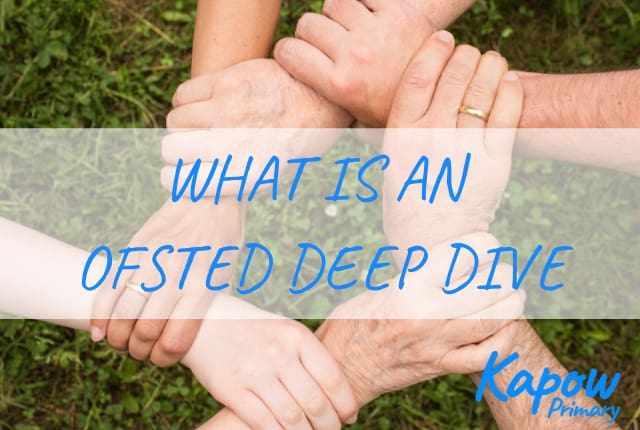What Is An Ofsted Deep Dive?
Written by Kapow Primary
Published on 13th November 2019
Last Updated: 29th February 2024
Written by Kapow Primary
Published on 13th November 2019
Last Updated: 29th February 2024

The question on everyone’s lips is – what is an Ofsted deep dive? What does that mean for me? The very term “deep dive” has been met with some derision by some in the teaching community, who dislike the “corporate” feel to the word and feel that branded words like that have no place in UK primary schools. Nevertheless, Ofsted have adopted an approach that now has a thorough dig into individual subjects, with the view that it’s a sure-fire way of ensuring that schools take non-core subjects seriously. That said, subjects that were previously of little interest to inspectors, have now suddenly taken centre stage, leaving already overworked and unsuspecting subject leads (who don’t get additional TLR payments or extra time) in the firing line. This blog post aims to settle the question of what a deep dive really is and provide some guidance and reassurance for primary school teachers so they know what to expect in the event of an Ofsted inspection.
According to Ofsted the aim of the deep dive “is to allow inspectors to gather the evidence necessary to form an accurate evaluation of how education flows from intention to implementation to impact within a school“
Put simply, a deep dive is an in-depth look by Ofsted inspectors at specific subjects in a school, based on the most recent Ofsted framework. It helps inspectors to get a feel for whether a broad and balanced curriculum is being offered, the quality of education the children are receiving, progression and sequencing, retention of prior learning, and whether the curriculum at the school is doing what is intended. Ofsted can choose any subject area for their “deep dive” during an inspection, including the subjects we offer here at Kapow Primary. For the purposes of inspection, a deep dive means looking at:-
Next question – what exactly are intent, implementation and impact?

Your school or subject’s curriculum intent is what you want children to learn, and the skills you want them to acquire. Be clear on exactly what this is so you don’t go off on a tangent. What is key to their future life chances? What do teachers think is their objective in teaching that subject?
Curriculum implementation is how you put your plans into practice, how you ensure that your intent is being carried out. How likely is it that the teaching methods used will deliver the teacher’s objectives for that subject?
Curriculum impact is whether the children have learnt what they are supposed to have learnt. Has the intent and implementation worked? What is the potential impact on the subject teaching on the pupils? Has the intent and implementation done what it is supposed to have done? Have the children gained the knowledge and skills that they need?
Ofsted explains that deep dives into subjects includes:-
The reason for this is to give Ofsted inspectors a full picture as to what is going on in your school in terms of subject coverage.
Of course Ofsted will ask whatever questions they see fit, but here are some examples of previous Ofsted deep dive questions from our community:

The good news is that this shows that there should be a greater emphasis on the arts, and other non-core subjects – great news for children and teachers – and that Ofsted has recognised this. The bad news is that this can be quite a large burden on a single subject lead, but this can also give you the opportunity to show your subject and school at its best and prove that what you are doing is beneficial for the children. View this as an opportunity to develop not only your subject but your school and curriculum, ahead of the inspection day. Then on the day itself, you can relax knowing that you’ve done everything you possibly can. The question remains, however, what happens if Ofsted feel that impact hasn’t been demonstrated? Then it will go back to the implementation and intent, and the school as a whole will have to review its implementation methods to see how it can improve.
You can use our progression of skills documents in both Art and D&T to help with this.
Naturally there’s nothing to replace advice from those teachers who have already been through an Ofsted deep dive, and here are some snippets:
Kapow Primary have produced a deep dive toolkit to help schools and teachers prepare for their next inspection, containing; guidance on the “3 Is”, typical deep dive questions, prompts, plans, templates and more.